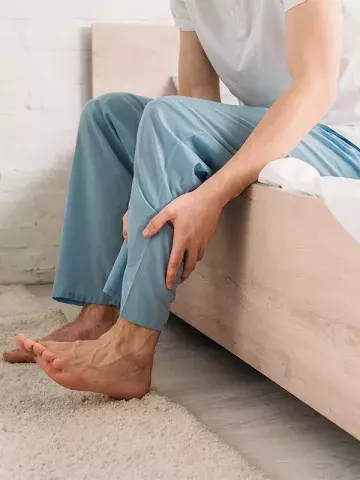Vitamin K2 may be effective and safe for nocturnal leg cramps
By Rebecca Jenkins
Vitamin K2 (menaquinone) significantly reduces the frequency, intensity and duration of nocturnal leg cramps (NLCs) in older adults, a randomised controlled trial finds.
About 50 to 60% of adults experience NLCs in their lifetime, Chinese researchers wrote in JAMA Internal Medicine, with an estimated 20% of affected people seeking medical intervention to help with bothersome symptoms. However, there were no available safe and effective treatments for NLCs, they said.
The multicentre, placebo-controlled randomised clinical trial investigated the effects of supplementation on community dwelling adults aged 65 years and older who had experienced two or more documented episodes of idiopathic NLCs during two weeks of screening.
Following screening, 199 eligible participants were randomised in a 1:1 ratio to take an oral capsule of vitamin K2, 180 mcg, or a placebo daily for eight weeks. Of the enrolled individuals, 108 (54.3%) were female, and the mean age was 72.3 years.
At baseline, the mean number of NLCs was comparable in the vitamin K2 group (2.60) and placebo group (2.71).
During the intervention, the vitamin K2 group’s mean weekly frequency of cramps reduced to 0.96, while the placebo group maintained a mean weekly frequency of cramps at 3.63, a statistically significant difference of –2.67.
The vitamin K2 group also had a more significant mean reduction in NLC severity (–2.55 points) compared with the placebo group (–1.24 points) and they also showed a greater mean decrease in the duration of NLCs (–0.90 minutes) compared with the placebo group (–0.32 minutes).
‘Our results demonstrated that daily vitamin K2 supplementation alleviates muscle cramps in older individuals affected by NLCs, manifested by decreased frequency, shortened duration, and weakened intensity,’ they wrote.
Vitamin K2 has been well documented to be a safe supplement, they added, noting no adverse events related to vitamin K2 were observed during the trial.
Professor Vasi Naganathan, Professor of Geriatric Medicine at The University of Sydney, Sydney, said the trial provided high-quality evidence that vitamin K2 could be an option for older patients experiencing NLCs.
‘The outcomes were clinically meaningful; however, there was no report on quality of life or sleep,’ he told Medicine Today.
Professor Naganathan, who is also a Consultant Geriatrician at the Centre for Education and Research on Ageing, Concord Hospital, Sydney, said given the findings, it could be worth trialling vitamin K2 in patients with NLCs, with some caveats, including that supplementation was not recommended for patients taking warfarin.
‘It’s also important to complete a proper clinical review to make sure the cramps are truly idiopathic – i.e. make sure they are not an indicator of a known or unknown disease, such as Parkinson’s, disease, hypothyroidism or liver cirrhosis,’ he said.
Professor Naganathan suggested establishing the cramps were truly troublesome before advising a trial of vitamin K2 and making patients aware that the evidence base was one recent good quality trial.
‘Consider the cost to patients of buying the vitamins, which are available over the counter, and advise that they should cease therapy if it is not helping after four to eight weeks,’ he said.


